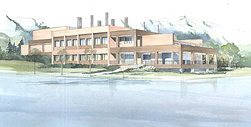This page has been archived and is being provided for reference purposes only. The page is no longer being updated, and therefore, links on the page may be invalid.
New ARS Poisonous Plant Research Lab Dedicated
By Marcia WoodNovember 16, 2004
LOGAN, Utah, Nov. 16, 2004--The Agricultural Research Service today dedicated a new $8.5 million building here to house its Poisonous Plant Research Laboratory on the campus of Utah State University. ARS is the chief scientific research agency of the U.S. Department of Agriculture.
ARS opened its poisonous plant laboratory on the Utah State campus in 1954. The laboratory is the nation's only federal facility specializing in research on toxic rangeland plants such as locoweed, lupine and larkspur. These plants weaken, deform and kill cattle, sheep, horses, goats and wildlife such as deer and elk.
|
|
The new 26,700-square-foot building will provide office and laboratory space for scientists, technicians and others specializing in chemistry, veterinary toxicology, veterinary pathology and rangeland science.
"These experts pinpoint the natural toxins in rangeland plants and develop effective tactics ranchers and wildlife managers can use to protect their grazing animals from these harmful weeds," said Rodney J. Brown, USDA's Deputy Under Secretary for Research, Education and Economics.
For example, researchers at the Logan laboratory were the first to identify a toxin in ponderosa pine needles that causes cattle to abort, a discovery that is an important first step toward developing an antidote. Their investigations of lupines that cause cleft palate in cattle and goats are being closely followed by medical researchers studying this birth defect in human infants.
"Our Logan scientists have earned a reputation for world-class research," noted ARS Administrator Edward B. Knipling. "This new building provides an up-to-date, high-tech working environment where these experts and their co-investigators can continue to broaden and deepen our knowledge of poisonous plants on U.S. pastures and rangelands."
Today's dedication ceremony also marked more than a century of poisonous plant research conducted under the auspices of the USDA, according to Lynn F. James, laboratory director.


